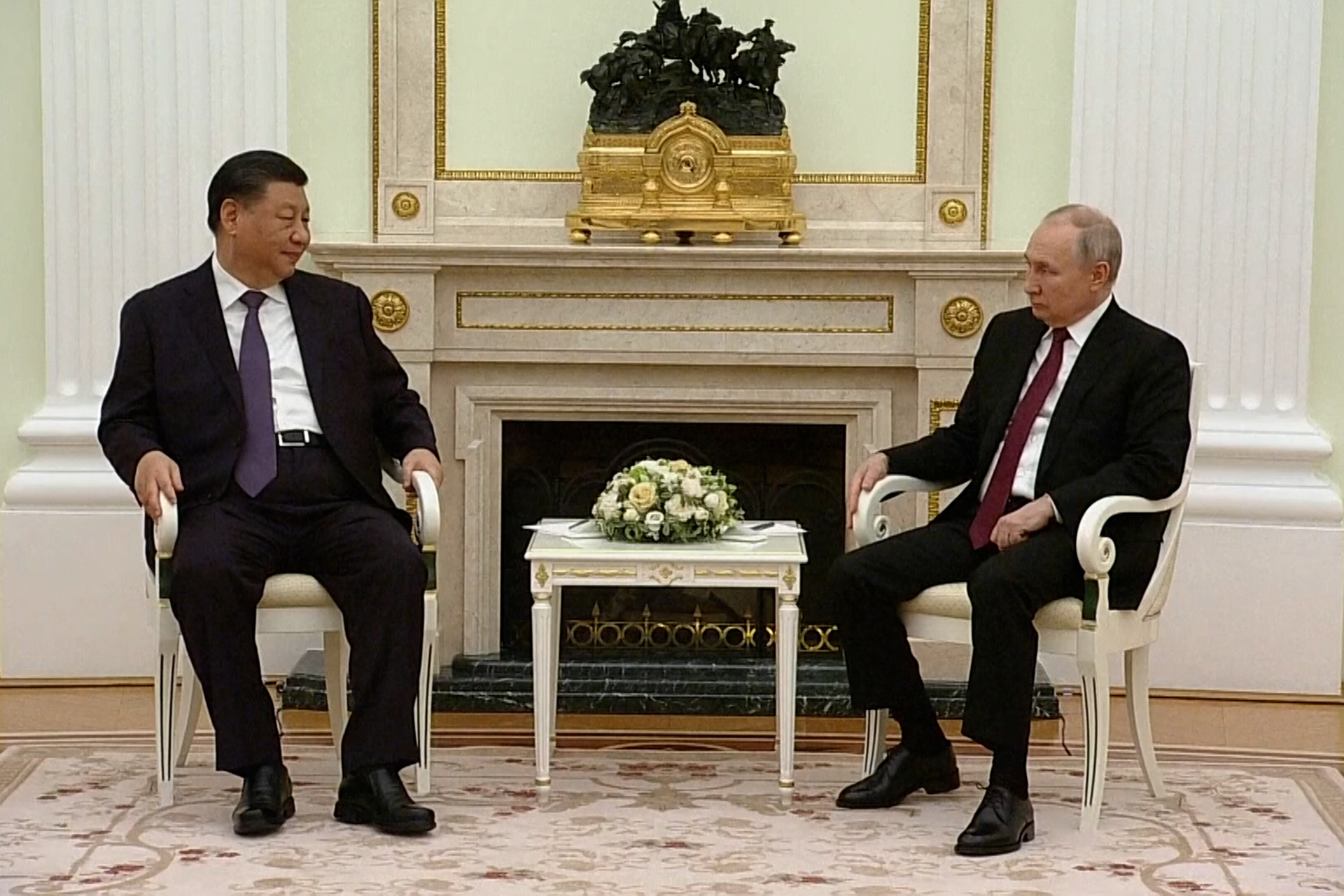MOSCOW – Chinese President Xi Jinping's three-day visit to Moscow is his first foreign visit since his re-election for a third term.
According to Russian presidential aide Yuri Ushakov, the talks, which are scheduled to begin on Tuesday, will focus on military-technical cooperation and energy, which appear to account for the lion's share of trade between the two countries, and which have grown in importance in light of Western restrictions on Russia.
This visit is also of great interest to observers due to the circumstances in which it comes, the unprecedented level of cooperation and understanding in relations between Moscow and Beijing, as well as its connection with talk of a Chinese initiative to resolve the crisis between Russia and Ukraine.
Moreover, the Chinese president is scheduled to hold an online meeting with Ukrainian President Volodymyr Zelensky after concluding his visit to Moscow.
Evolving Relationships
In addition to the political and economic aspects, Moscow and Beijing have developed military cooperation between them, in 2019 Russian President Vladimir Putin revealed that his country helped China develop a missile attack warning system.
Because China purchased S-400 and Su-400 fighter jets from Russia in 35, the United States imposed sanctions on Li Shangfu, who was appointed defense minister last week.
With the continuation of what Russia calls the military operation in Ukraine and the growing crisis in relations between China and the United States, Russian experts point to a shift in the balance in this triangle, as China - on the one hand - is the main beneficiary of sanctions pressure, and it has become the largest sales market in Russia.
China's close ties with Russia, which have been strengthened by the growing conflict in Ukraine, pose a threat to its relations with the United States and Europe.
Salam Initiative
According to international relations expert Alexander Konkov, this is one of the reasons why China put forward a peace initiative between Moscow and Kiev.
Speaking to Al Jazeera Net, Konkov asserts that if in the past any peace plan proposed by Beijing can be ridiculed, given the huge weight it enjoys now, any initiative it may put forward in this context - especially after its role in resolving the crisis between Saudi Arabia and Iran - will have "appeal by many parties concerned, except for the West, which is uncomfortable with the growing Chinese role," according to his opinion.
According to Konkov, Russia and China are trying to formulate new concepts of the development of the contemporary world, so that it is without sanctions, barriers or customs restrictions, to face common dangers as a result of the deterioration of relations with Washington.
It is noteworthy that the Chinese Foreign Ministry had put forward last February a 12-item initiative that included its position on a political settlement of the Ukrainian crisis, and its most prominent points are:
- Respect for the sovereignty and territorial integrity of all States.
- Resumption of direct dialogue between Moscow and Kiev.
- Call to prevent further escalation.
While Moscow was "reticent" in expressing the initiative's "positivity," the Western system was quick to criticize it, calling it openly pro-Russian.
But the Chinese proposals are not aimed at supporting Moscow, according to Vladimir Portyakov, a researcher at the Center for Policy Studies and Forecasts at the Institute for Contemporary China and Asia, because the first item calls for a return to the 1991 borders, an item that would not make it acceptable to the Kremlin.
According to Portyakov, the Chinese president's visit comes to reaffirm the support for bilateral relations and take them to a new level of understanding, despite the substantive exchange of views on the situation in Ukraine and the prospects for overcoming the crisis.
Economy First
But regardless of the future of the Chinese initiative on Ukraine and the reactions to it, the economic aspect remains the most prominent present in the Chinese president's visit to Moscow, in 2022, bilateral trade between Russia and China reached a record $ 190 billion, up from the amount of $ 147 billion achieved in 2021, largely due to the significant increase in the prices of Russian commodities over the past year.
Deliveries of Chinese goods to Russia in 2022 set a new record of $76 billion, up 13 percent from 2021.
On this basis, in terms of imports, Russia is now the country most dependent on China – or at least the second – after North Korea.
This comes despite the fact that for China – the world's number one exporter since 2009 (total exports in 2022 amounted to $ 3.6 trillion) – trade with Moscow is of much less important value, as at the end of 2022 Russia accounted for about 2% of China's total exports abroad, and 3% of China's total trade with all countries.
Also notable is the Chinese yuan's role in the Russian economy, which faces restrictions from the United States and the European Union on foreign exchange transactions.
According to the Russian Central Bank, the yuan's share in export foreign trade settlements jumped to 16 percent, and imports to 23 percent (compared to 4 percent at the beginning of 2022).
Yuan-denominated assets now account for about half of Russia's total liquidity of the National Welfare Fund, and the Chinese currency's monthly trading volumes on the Moscow Stock Exchange have increased dozens of times, followed by stock exchange data.
But economist Victor Lashon points out – in an interview with Al Jazeera Net – that the Chinese economy in terms of GDP is 10 times stronger than the Russian economy, and therefore "the law of economic gravity is ruthless here, large economies usually attract smaller economies."
In his view, economic cooperation between Russia and China will ultimately be more beneficial to the latter, although Russia considers strengthening relations with China one of the most important factors in confronting Western sanctions and their consequences.

